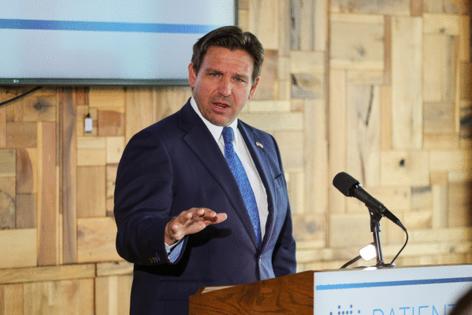Lawmakers grant Florida DOGE power to fine cities, counties
Published in News & Features
ORLANDO, Fla. — Florida cities and counties could soon face fines if they don’t grant Gov. Ron DeSantis’ DOGE team access to their data systems, personnel and buildings as it hunts for financial waste and targets diversity, equity and inclusion efforts.
A last-minute addition to a budget bill approved Monday granted the new powers to the governor’s office, giving it the ability to issue $1,000 daily fines to local governments that don’t comply with requests.
“We look forward to using this additional authority to identify and eliminate waste at all levels of government,” said Brian Wright, a spokesman for the governor’s office. “The penalty provision is a mechanism considered in the event of noncompliance with state law.”
DeSantis’ DOGE task force, created in February, is modeled after the federal government’s Department of Government Efficiency. The federal DOGE, launched by billionaire Elon Musk, came under fire from critics who said it made hasty and damaging cuts.
Opponents say Florida’s new DOGE provisions, which received little vetting from lawmakers, could lead to serious repercussions.
“We are looking at a state-level version now of the disaster that we saw on the federal government,” Sen. Carlos Guillermo Smith, D-Orlando, said Monday in a floor speech explaining his no vote. “Does this mean that the governor is going to send a bunch of 20-something-year-old bros who have no experience into local cities and counties?”
Another DOGE-related bill expanding the state’s watchdog powers failed to pass during the Florida Legislature’s regular session, but the issue was resurrected during 11th-hour budget negotiations. Lawmakers approved the new DOGE language late Monday just before they adjourned. It now heads to DeSantis for his signature.
If he approves it as expected, the governor’s Office of Policy and Budget could review local governments’ spending for potential waste and fraud, redundant services and “diversity, equity, and inclusion initiatives inconsistent with law.”
The legislation lists a variety of records that must be turned over if requested, including contracts, grants, job descriptions, employee training materials, budgets and audits. Floridians already have access to a large volume of such documents through the public records law.
Local governments that receive state funding would have seven business days to provide the requested information or face fines. The provisions shield information considered confidential under federal or state law from disclosure. Fines must be authorized by a three-fourths vote of the Administration Commission, which is composed of the governor and the Florida Cabinet.
Supporters said local governments need more scrutiny on how they spend the public’s money. Sen. Jason Pizzo, a Democrat-turned-independent from South Florida, said he’s been frustrated by some cities that are “blowing untold amounts of money on really stupid things,” listing international trips as an example.
“As some of my very astute mayors said to me, ‘Those of us who don’t have larceny in our heart have nothing to worry about’,” he said during debate on the measure.
About 40 cities and 40 counties are voluntarily working with the Florida DOGE team, according to the governor’s office. That list includes Lake County, Altamonte Springs and Lake Mary in Central Florida. These government boards have voted to support the state’s efforts, and some have formed their own local DOGE teams.
In March, DeSantis took the unusual step of demanding that all local governments report any financial problems they have or expect to have. Most reported back they had no issues to flag.
In April, state officials requested a variety of information from the local governments cooperating with their efforts — from spending reports to employee salaries. Under the new legislation, the state could broaden its investigations to local governments that haven’t signed onto its efforts.
The DOGE team has also been reviewing university research and grants. In particular, it took issue with an $800,000 federal grant awarded to the University of West Florida to train science and math teachers that mentioned “social justice” and “culture responsiveness,” words that have drawn the ire of conservatives targeting diversity initiatives.
The efficiency push comes as DeSantis targets property taxes, a key source of revenue for local governments. He wants a measure that would abolish property taxes on the 2026 ballot, arguing cities and counties have raked in excess revenues with rising home values.
Asked about the DOGE efforts, Central Florida officials emphasized their commitment to open records and transparency. Orlando will assist anyone seeking access to public records, city spokeswoman Ashley Papagni said in an email. Orange County Commissioner Mayra Uribe said she welcomes the additional scrutiny.
“I thought it was a perfect opportunity to look internally to make sure we were being as cost efficient as we could in every aspect,” Uribe said of Florida DOGE.
Local governments are subject to other oversight already. Counties and cities must report serious financial problems to the governor or Legislature for potential corrective action. They also approve in public their budgets and tax rates, which every member of the public can access online, and submit annual audits to lawmakers.
Rep. Anna Eskamani, a candidate for Orlando mayor, has been critical of DOGE, saying the federal efforts have caused chaos rather than efficiency.
The Orlando Democrat wrote on social media she voted against the new state powers, which she said will allow the governor to “investigate, fine and punish local governments.”
------------
©2025 Orlando Sentinel. Visit at orlandosentinel.com. Distributed by Tribune Content Agency, LLC.







Comments